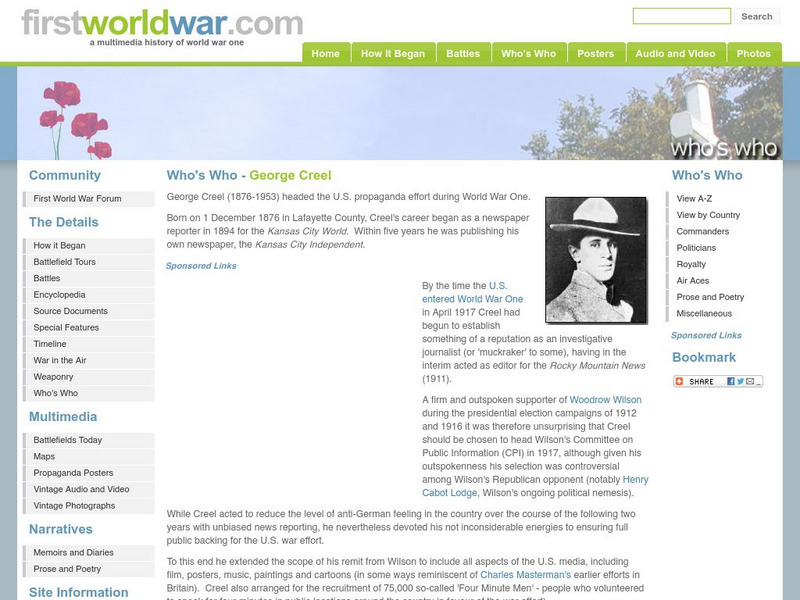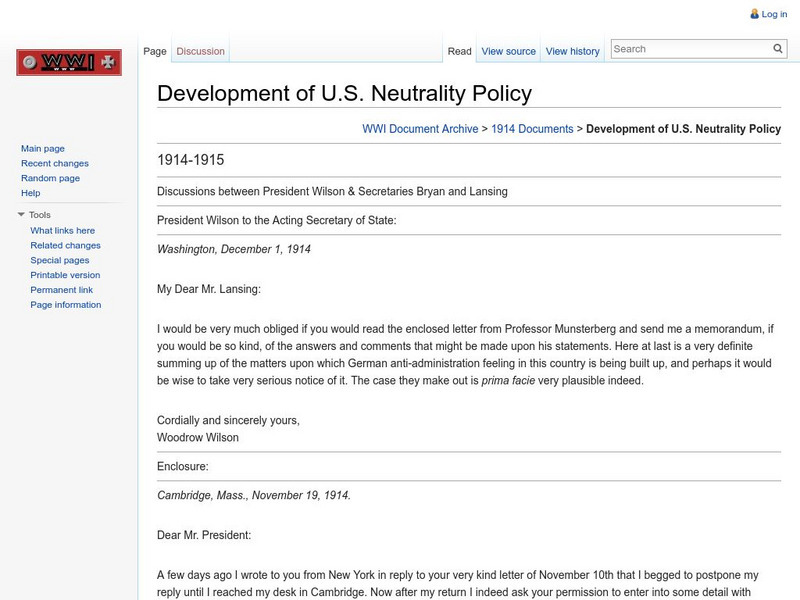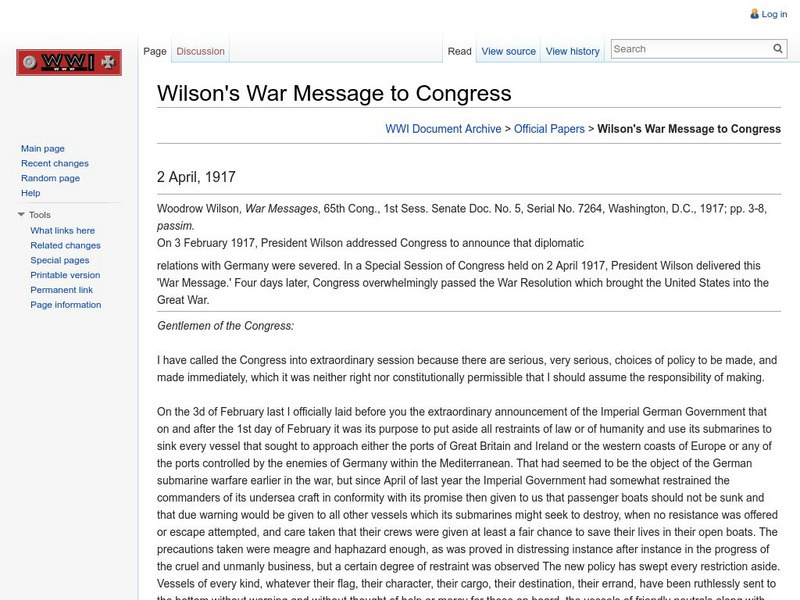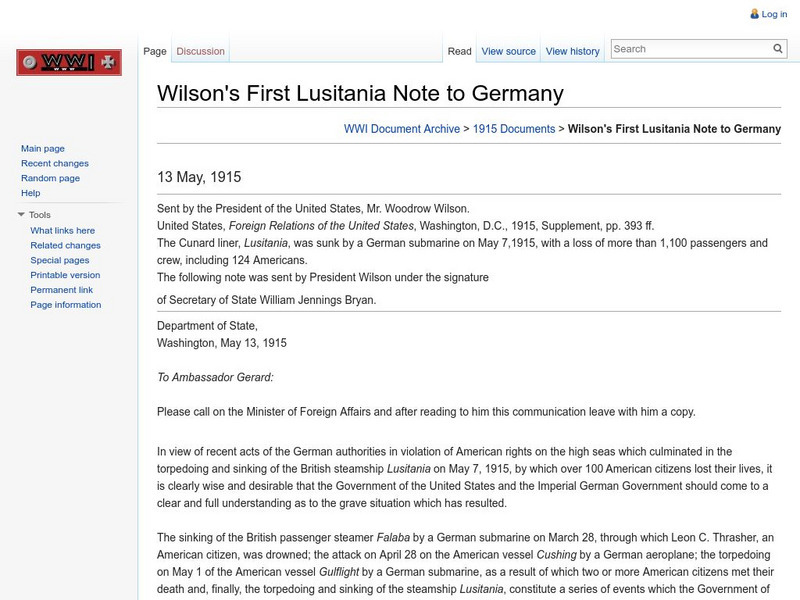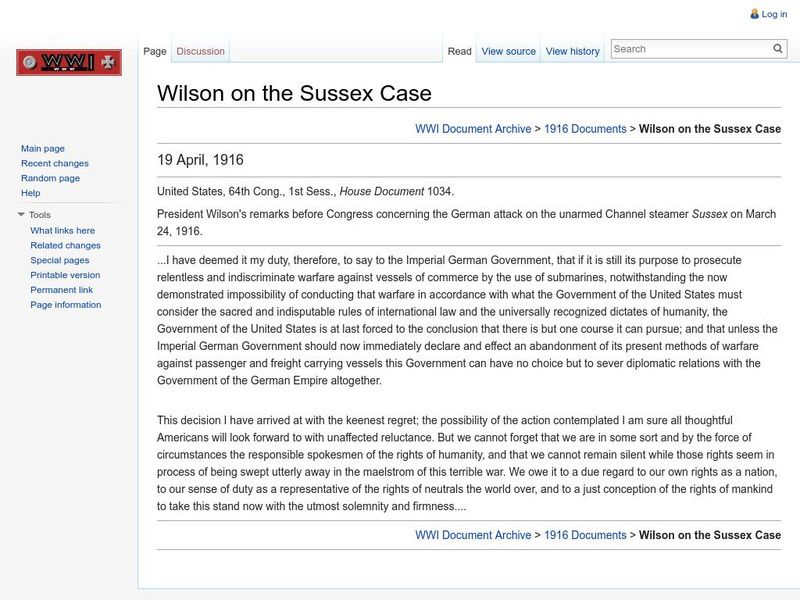Curated OER
The Embodied Presidency Wilson
Students take a closer look at U.S. intervention in Mexico. In this 20th century history lesson, students examine primary documents to consider why the United States entered the Mexican War and then write DBQ essays on the topic.
National Endowment for the Humanities
The Debate in the United States over the League of Nations: Five Camps: From Voices of Consent to Voices of Dissent
Young scholars explore and discuss Woodrow Wilson's concepts for peace and the League of Nations. They understand efforts made to foster American support for the League and discuss the opposition shown in the Senate.
Curated OER
United States Entry into World War I: Some Hypotheses About U.S. Entry
Students determine the most compelling evidence explaining why the U.S. entered WWI. They read and discuss a handout of reasons why the U.S. entered the war, and take a poll as to which reason was the most compelling.
Curated OER
Woodrow Wilson
In this online interactive history quiz worksheet, students respond to 50 multiple choice questions about the accomplishments of Woodrow Wilson. Students may submit their answers to be scored.
Curated OER
Woodrow Wilson
In this online interactive history worksheet, students respond to 10 short answer and essay questions about the achievements of Woodrow Wilson. Students may check some of their answers on the interactive worksheet.
Curated OER
The Rules of War/World War I
Students explore the reasons the United States became involved in World War I. In this World History lesson, students research the reasons Woodrow Wilson made the decisions he did, prepare a debate and write a paper.
Curated OER
Lesson 4: Fighting for Peace: The Fate of Wilson's Fourteen Points
Students analyze foreign policy. In this Fourteen Points lesson, students examine Wilson's Fourteen Points, explore Allied reaction to the Points, and compare Wilson's foreign policy to the Versailles Treaty.
Curated OER
Lesson 2: "To Elect Good Men": Woodrow Wilson and Latin America
Young scholars analyze Woodrow Wilson's foreign policy. In this foreign policy instructional activity, students examine how the Wilson administration responded to civil unrest in Latin America.
Curated OER
Woodrow Wilson and American Involvement in the Great War
Students examine American involvement in World War I. In this World War I lesson, students investigate Wilson's policy of neutrality as they read excerpts from his messages to Congress. Students respond to questions regarding the...
Curated OER
The First World War
In this World War I worksheet, learners review a chapter as they match 5 men to their accomplishments, read 5 false statements then make them true, and identify 2 historical themes pertaining America's role in the war.
Curated OER
Treaty of Versailles
Young scholars watch and listen to a PowerPoint presentation about the Treaty of Versailles, then write an editorial criticizing the Big Three. Students write from the perspective of a German in 1920 who has just learned of the harsh...
Curated OER
Woodrow Wilson: Prophet of Peace
Students read and discuss various speeches by Woodrow Wilson, and write and present a brief radio address that will persuade the nation to return to world peace. Students analyze current events and discuss whether the world has upheld...
Curated OER
United States Entry into WWI: Two Diametrically Opposed Views
Learners reconsider the events leading to US entry into WWI through the lens of archival documents.
American Presidency Project
American Presidency Project: Wilson's Speech to Naturalized Citizen
Read this speech given by President Wilson to an audience of naturalized citizens about Americanism and what it means to be an American. Contrast Wilson's message with the notion that Progressives generally supported immigration...
First World War
First World war.com: George Creel
This site gives a biography of George Creel (1876-1953) including his pro-war efforts and role in heading the U.S. World War One propaganda effort.
National Endowment for the Humanities
Neh: Edsit Ement: Woodrow Wilson and Foreign Policy
A thorough review of Woodrow Wilson's foreign policies in these four lessons offered by EDSITEment. Learn the origins of "Wilsonianism," Wilson's views on relations with countries in Latin America, Wilson's decision to enter World War I,...
Library of Congress
Loc: Portraits of the Presidents & First Ladies
A collection from the Library of Congress of formal and informal portraits of the US presidents and their first ladies.
Library of Congress
Loc: Herblock's Presidents
Historically significant collection of political cartoons featuring U.S. Presidents from Library of Congress online teacher-student resources.
Brigham Young University
Brigham Young Univ.: Wwi Document Archive: Development of u.s. Neutrality Policy
Correspondence of two Secretaries of State in 1914 and 1915 outlining America's neutrality and the ways it is being demonstrated to countries in Europe.
Brigham Young University
Brigham Young University: Wwi Document Archive: Wilson's War Message to Congress
Brigham Young University provides the full text of Woodrow Wilson's "War Message" which resulted in Congress passing the War Resolution, allowing the United States to enter World War I.
Brigham Young University
Brigham Young U.: Wwi Document Archive: Wilson's First Lusitania Note to Germany
Read the text of a note sent to the German government by Woodrow Wilson protesting the sinking of the Lusitania.
Brigham Young University
Brigham Young University: World War I Document Archive: Wilson on Sussex Case
President Wilson's remarks before Congress concerning the German sinking of the unarmed Channel steamer Sussex on March 24, 1916.
American Presidency Project
American Presidency Project: State of the Union Addresses and Messages
This site compiles all of the State of the Union addresses and messages by all the presidents in U.S. history (except William Henry Harrison and James A. Garfield).
US National Archives
Nara: Teaching With Documents: Political Cartoons
Offers teaching activities, four political cartoons, and a narrative about reforms proposed by three major presidential candidates in 1912: Theodore Roosevelt, William Howard Taft, and Woodrow Wilson.














